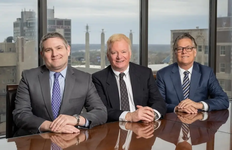The US population is older than it has ever been – about one in five Americans will be age 65 or older in 2040, up from around one in eight in 2000. Each day, around 12,000 Americans turn 65, which is typically the age when they become eligible to receive Medicare benefits. As their Medicare premiums are dependent on their level of income at age 63, it is important for people in the pre-retirement ages (55 to 62) to properly plan for their post-retirement tax situation to avoid paying more than they absolutely have to.
George McReynolds, Certified Financial Planner and Founder of Personal Tax Service, LLC, says that pre-retirees are often unaware of a number of significant “tax bombs” that could catch them by surprise and explode, leading to losing much of their hard-earned money to taxation.
According to McReynolds, people planning for retirement usually fail to take inflation into account, as they view their future costs in today’s dollars. They may also underestimate how much they need to maintain their pre-retirement standard of living, and that includes significant healthcare costs. Finally, they may live longer than they expect, requiring more money. This is why McReynolds works closely with pre-retirees to ensure that everything is in order before they reach retirement age.
One of the more common pieces of financial advice being thrown around today is that pre-retirees should defer their taxes until post-retirement, so they can be placed into a lower tax bracket. However, McReynolds disagrees with this strategy, and he says that it creates a “ticking time bomb”, especially when tax rates are likely to increase in the future. With the Tax Cuts and Jobs Act expiring in 2026, tax brackets are going back up and the standard deduction gets cut in half, so people may end up paying more taxes in the future. People can be vulnerable to “trip wires” or stealth taxes, such as having to pay a tax of 40%, despite being in the 15% tax bracket.
McReynolds says that taxes are “on-sale” right now, which is why it makes sense for many pre-retirees to take care of it in the present rather than leave it for the future. This includes moving things from the tax now bucket to the tax never bucket, which helps defuse the tax bomb.
“I always say that the ages 55 to 62 are the best time to consult a tax professional and do proper tax planning,” McReynolds says. “This is usually when earning potential is at the highest, giving them plenty of room to maneuver. If they wait too long, they might run out of time and get hit by higher tax rates and various stealth taxes.”
The most important thing pre-retirees need to know is what their after-tax retirement savings will look like even before they retire. For retired people, they need to start evaluating next year’s potential tax bill before they start tapping assets in the new year.
McReynolds adds that Social Security and Medicare have “tax traps” that pre-retirees need to plan for. IRA withdrawals can cause the taxation of Social Security benefits, and push taxpayers into a higher marginal tax rate. Meanwhile, higher income (i.e. withdrawing assets) can cause potentially hundreds of dollars a month extra in Medicare premiums. This includes the income-related monthly adjustment amount (IRMAA), which is a surcharge added to the Part B and Part D Medicare premiums.
By working with a tax professional, pre-retirees will be able to plan how and when to use taxable, tax-deferred, and tax-free assets to manage their income and tax brackets efficiently. McReynolds also stresses the importance of estate planning – it’s not just something for the ultra-wealthy. In fact, middle-class retirees need it more to ensure the next generation does not lose much-needed money to taxation. Long-term care is a major concern for many people, and they need to plan how to fund this likely expense and still leave an inheritance for their heirs.
One’s tax exposure situation is not static throughout retirement, which is why they need a tax strategy that anticipates how and when to tap assets to cover personal expenses, understands the range of taxes retirees will face at various stages, and manages their actions to pay as low a tax rate as possible.
An Army veteran and former SWAT police officer, McReynolds pursued a career in banking before becoming a Certified Financial Planner and tax professional in 1995. He is passionate about helping set people up properly for retirement, allowing them to enjoy their later years and maximize their life savings.
“Retirement and taxation are a huge minefield, and one misstep could lead to huge financial losses,” McReynolds says “Having trained in bomb search techniques in the state police academy, I apply that skill of searching for potential hidden dangers and defusing them when creating a tax strategy that will last clients through their retirement.”
Media contact:
Name: George McReynolds
Email: [email protected]
There is no offer to sell, no solicitation of an offer to buy, and no recommendation of any security or any other product or service in this article. Moreover, nothing contained in this should be construed as a recommendation to buy, sell, or hold any investment or security, or to engage in any investment strategy or transaction. It is your responsibility to determine whether any investment, investment strategy, security, or related transaction is appropriate for you based on your investment objectives, financial circumstances, and risk tolerance. Consult your business advisor, attorney, or tax advisor regarding your specific business, legal, or tax situation.






